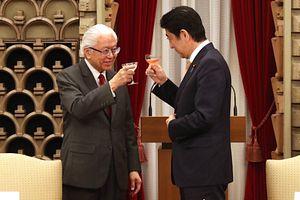Singapore’s President Tony Tan embarked on his first state visit to Japan from November 28 to December 6 to celebrate the 50th anniversary of the Singapore-Japan bilateral relations. This is just the second time in history that a Singaporean president has visited Japan. Beyond diplomatic theatrics, this visit is significant as it signals Singapore’s desire to strengthen economic and diplomatic ties with Japan in the face of tumultuous Singapore-China relations and a possible U.S. retreat from the region.
With Tan’s visit, the two highest-ranking Singaporean officials have each visited Japan in the space of less than three months. In September, Singapore Prime Minister Lee Hsien Loong met with Japanese Prime Minister Shinzo Abe, where they inked trade deals and discussed the possibility of Japan playing a more active role in the region. Both countries also agreed to form a vice-ministerial level committee to accelerate discussions over expanding the bilateral air services agreement. If successful, this would augment Singapore’s Changi Airport and Tokyo’s Narita airport as aviation hubs and guard against increasing competition from other regional airports, including those in China.
The Singapore-Malaysia High Speed Rail project may present Japan with yet another opportunity to enhance its presence in the region. As expected, during the president’s visit, the two sides discussed Japanese bullet train technology in light of Tokyo’s interest in the project, with Tan praising Japanese trains and technology more generally.
Japan is pushing strongly for its iconic Shinkansen bullet train technology to grace the 350 km rail tracks that traverse across Singapore to Kuala Lumpur. This is especially important in the wake of Japan’s failed bid for Indonesia’s Jakarta-Bandung High Speed Rail, which was eventually awarded to China. If Japan wins the Singapore bid, it would be a strategic setback for China’s plans to dominate high-speed rail production in Southeast Asia.
As chances for U.S. ratification of the Trans-Pacific Partnership dim, Japan’s support of the TPP presents a lifeline for Singapore and other participating countries who hope to salvage the treaty. If it comes into force, the TPP will accounts for 40 percent of world trade and eliminate an estimated 18,000 tariffs. The treaty will have to be ratified by at least six out of the 12 signatories, who collectively comprise of at least 85 percent of the group’s total economic output, unless provisions are revised. As the second largest economy in the TPP, Japan’s ratification is crucial for the treaty to come into effect.
During his visit, Tan said he regretted the trend toward isolationism in the economic realm and said that Singapore and Japan would work together “to ensure that this trend of freer trade and liberalization of economies is not stalled or reversed.”
As Singapore and Japan commemorate 50 years of bilateral ties amidst geopolitical turmoil, this golden jubilee may present an opportunity for Japan to be more proactive in the region.

































